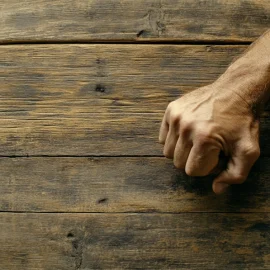

This article is an excerpt from the Shortform summary of "Rich Dad Poor Dad" by Robert T. Kiyosaki. Shortform has the world's best summaries of books you should be reading.
Like this article? Sign up for a free trial here .
What are mental obstacles? How are they stopping you from achieving wealth and financial independence?
Mental obstacles may be stopping you from reaching your full financial potential. Things like self-doubt and laziness are mental obstacles that can stop you from going after what you want or making smart decisions. Learn how to overcome those mental obstacles and achieve financial independence.
Overcome Your Mental Obstacles
More people have the potential to be happy, but common mental obstacles get in the way. People who overcome these obstacles get a huge advantage.
Self-Doubt
Self-doubt or lack of self-confidence hold all of us back, to some degree. Some are affected more than others.
In the real world, more than just intelligence and grades is required. Guts, chutzpah, balls, daring, tenacity, grit are different names for the factor that plays a huge role in success.
When you recognize a great opportunity, you must have the courage to chase it.
(Shortform example: a quote from Charlie Munger: “We read a lot. But that’s not enough: You have to have a temperament to grab ideas and do sensible things. Most people don’t grab the right ideas or don’t know what to do with them.”)
Fear Shows Many Mental Obstacles
Fear manifests in a lot of ways. Here’s how you can overcome this mental obstacle.
Fear of Losing or Failure
Fear of losing makes you play it safe and avoid opportunities that can have huge upsides and relatively low downsides. Control your fear of losing, money or otherwise. Everyone has fear of losing money, but you have to handle it properly.
- (Shortform note: This is well rooted in psychology – losses are more painful than equivalent gains. See Kahneman’s Thinking, Fast and Slow.)
School teaches us that mistakes are bad, but this is terrible for real life. Winners aren’t afraid of losing, but losers are. People who avoid failure also avoid success.
Every rich person has lost money. Someone who has never lost money is probably not rich.
Winning requires being unafraid to lose.
Failure will only make you stronger and smarter. Take a loss and make it a win. Use your failure to inspire yourself to become a winner. For winners, losing inspires them. For losers, losing defeats them. Use this sentiment to lower the perceived cost of failing.
Rich Dad says he like Texans, because “when they win, they win big. And when they lose, they lose big, and it’s spectacular. If you’re going to go broke, go big. Don’t admit you went broke over a duplex.” Even though the South lost at the Alamo, they handle failure fondly, shouting, “Remember the Alamo!”
(Shortform caveat: of course, taken to the extreme with an uninformed person, this can cause excessive risk taking and catastrophic losses.)
Fear of Risk
Fear of risk is one of the most common financial mental obstacles. Don’t be afraid of turbulence or risk. “I’d like to, but I’m due for promotion in three months” is the classic excuse. There is always another carrot dangled ahead of you, and so there’s always a good reason not to do what you really want to do.
Fear of Rejection
Don’t be afraid of rejection. Fear of ostracism prevents people from having nonconsensus opinions. As it relates to finance, it’s in 1) not bucking the consensus traditional way of handling your career and money, 2) keeping up with the Joneses and matching spending. Focus on yourself and your personal goals, regardless of what other people think.
If you fear all of these things, you can still be rich. But it requires a wiser, more conservative path: start young, save money, and use compound wealth to become rich when you’re old.
Cynicism
There will always be at least one reason something won’t work. Fixating on these reasons pessimistically will paralyze you from taking any productive step.
Common meaningless rebuttals:
- What if things don’t go as planned?
- What makes you think you can do that?
- If it’s such a good idea, how come someone else hasn’t done it?
- That will never work.
Use your analysis to find opportunities that critics are blind to. Remember, other people are blind to opportunities because they seek security and safety.
Laziness
This mental obstacle might stop you from seeing or overcoming over mental obstacles. Some people feel developing financial intelligence is too much hassle. Consider, would you rather put in some hard work now and enjoy decades of a better life, or suffer through the rest of life?
Counterintuitively, busy people are often the most lazy. They stay busy as a way of avoiding something they don’t want to face.
Consider someone who works all day and weekends to make ends meet, without confronting bigger problems like how to build wealth or their family’s well-being. They can brush off investment opportunities as, “I’m working hard enough as it is, and my boss wants me to do more work. I don’t have the time.” In reality, they don’t want to push themselves to do the harder thing of figuring out novel, less-obvious solutions to getting more money.
Forcing yourself to think about how to make more money is like exercising at the gym. The more you work your mental money muscles out, the stronger you get.
Corollary: Find areas that people don’t to work in, and there are likely unclaimed opportunities there.
- People often don’t want to invest in real estate because they don’t want to fix toilets. Their loss is your gain. And in reality, you can hire a property manager to handle the physical work.
Feeling Guilt for Being Greedy
We’ve been raised to think of greed or desire as bad. “Stop thinking about yourself. Why don’t you think about others?”
In reality, self-interest (generally, wanting to make your own life better) drives innovation and value for other people. This is the cornerstone of capitalism.
Condemning greed might be a trained defense, learned helplessness. “I don’t know how to become rich. So I’m just going to try to believe being rich is bad, and there’s valor in not wanting to be rich. Even though secretly I would love to be rich.” It’s easy to imagine parents feeling this, then teaching it to their kids.
Arrogance
“If you want to improve, be content to be thought foolish and stupid.” –Epictetus
Arrogance is ego plus ignorance.
When you’re ignorant in a subject, recognize this, then educate yourself.
Intelligent people welcome new ideas, since new ideas add synergy with other ideas.
Don’t be afraid of people smarter than you. Find out how to get them to work with you.
Don’t feel a trade is underneath you. Some people have an allergy to learning sales techniques, without realizing that much of the world runs on sales of some sort.
False Mental Obstacles: Lack of Money
Many people don’t even start their pursuit with the excuse that they don’t have the money. This doesn’t stop the courageous opportunist from making progress.
Robert Kiyosaki shares how he bought an apartment complex without money by writing a contract between seller and buyer, and basically earning a finder’s fee for the transaction.
It may be difficult, but you can learn to overcome your mental obstacles. With so many opportunities out there, you shouldn’t let mental obstacles stop you from achieving your goals.

———End of Preview———
Like what you just read? Read the rest of the world's best summary of Robert T. Kiyosaki's "Rich Dad Poor Dad" at Shortform .
Here's what you'll find in our full Rich Dad Poor Dad summary :
- The key differences in how rich dad and poor dad approached life
- Why it's a terrible idea to buy an expensive house
- How to overcome your own mental blocks to become wealthy for life






